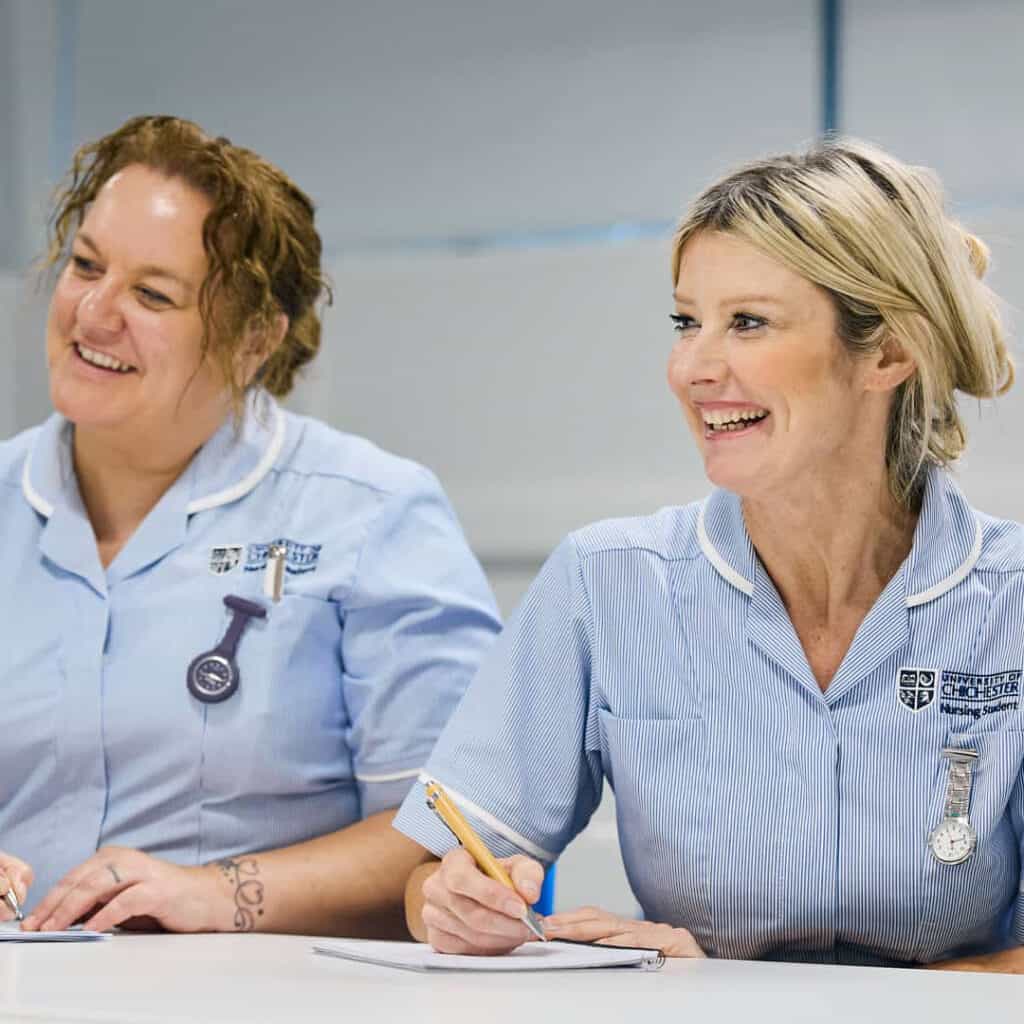Top 30
UK university out of 122 institutions
Guardian University Guide 2025
Gold
rated university in the Teaching Excellence Framework
TEF 2023
7th
best university in the South East
The Times and Sunday Times Good University Guide 2024
Overview
Build on your experience in a healthcare role on this accelerated blended learning course
NHS Learning Support Fund (eligibility criteria applies)
Receive at least £5,000 a year of NHS Funding on this course, with up to £3,000 further funding available for eligible students. You can find out more on the NHS website.
Transition into adult nursing with NMC adult nursing registration
Our accelerated, blended learning Postgraduate Diploma in Adult Nursing (Pre-Registration) course develops you into a resilient, attentive and caring professional ready for the ever-changing and dynamic healthcare sector.
We offer small cohorts in a community and welcome graduates from any subject who can demonstrate the required level of professional experience within the healthcare sector and who are looking to develop skills, knowledge and professionalism to make an impact on people’s lives.
Please note: Applicants who require a student visa to enter the UK, are in the UK on a Skilled Worker Visa or are dependant on a skilled worker are not eligible to be considered for this course.
Finalists for two Student Nursing Times Awards
We’re proud to be finalists for two Student Nursing Time Awards 2025 in the following categories:
- Nurse Education Provider of the Year
- Teaching Innovation of the Year
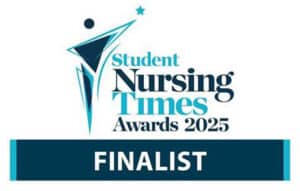
Develop your person-centred approach
You will learn how to care for adult patients in any health care setting, assess their needs to plan and deliver the most appropriate care for them and evaluate the results.
We will support you in becoming a caring and compassionate professional who delivers skilled, evidence-based care in partnership with patients, families and communities.
Blend interactive teaching sessions with online study
Our approach allows for flexibility in learning. It combines immersive, interactive learning sessions using our brand-new on-campus facilities with virtual online learning with your tutors.
You will be required to attend campus one to two days a week during the academic blocks. In addition, guided and independent online study will further develop your knowledge and understanding. This includes (from academic block 2) a weekly placement experience day to develop your understanding of wider healthcare delivery.
Experiential learning through cutting-edge technology
Our brand-new facilities offer innovative teaching methods that provide immersive learning experiences and simulation-based learning, allowing you to engage with scenario-based activity using robotic manikins, virtual reality and actors to reflect real situations.
Head of School of Nursing and Allied Health Dr Nita Muir has published international research in virtual simulation learning, and Senior Lecturer James Wilson is a National Teaching Fellow with expertise in Forum theatre.
Facilities include:
- Immersive sensory simulation space
- Virtual reality equipment
- Six-bed clinical practice area
- Responsive robotic mannequins
- Simulated community nursing settings.
Work alongside our practice-experienced staff
Our skilled and expert staff are all registered nurses who are either academic or also clinicians in practice who will support you to achieve your learning goals.
Study on a nationally-accredited course
This course is accredited against the Nursing & Midwifery Council’s (NMC) 2018 standards, enabling you to be eligible to seek admission to part 1 (Adult) of the NMC register on successful completion of this two-year programme.

Guaranteed employment within UHSussex
University Hospitals NHS Trust guarantees employment within UHSussex as a Registered Adult Nurse for those students who successfully complete their degree at the University of Chichester and gain professional registration.
This is subject to successful pre-employment checks at the time of graduating.

The Course
Learn through a combination of theory, simulation, practical sessions and placements
Combine academic study with practical skills
On this course, you will spend 50% of your time in academic study and the remaining 50% will be within a clinical placement or simulation-based learning environment.
Apply theory to practice through clinical placements
Throughout the course, you will undertake placements at local health and social care organisations to provide you with the required level of experience and knowledge for a registered nurse.
Studies areas include:
- Caring sciences
- Person-centred care
- Professional issues
- Health and wellbeing
- Mental and physical health conditions
- Preparing for practice learning.

Dr Nita Muir
MSc Top-Up
Once you have completed your Postgraduate Diploma, you’ll have the option to return to your studies within a few years and complete your dissertation through topping up to a MSc in Adult Nursing.
Modules
Select a year
Becoming a Graduate Professional Nurse
This all-field, shared delivery module supports you in transitioning to professional nursing practice. It covers the foundational knowledge that underpins person-centred care and caring science, including an introduction to human anatomy, physiology, professionalism, and the values and skills that frame nursing practice.
The module introduces the essential themes of becoming a nurse alongside meeting the fundamental care needs of people and their carers. It explores the theory and methods used to ensure an individual approach establishes an effective therapeutic relationship between the nurse and the person receiving care.
Adult Field Specific: The module will introduce the foundational essentials of adult nursing including an introduction into organising and leading care. This will incorporate developing an individual’s resilience through self-awareness.
Preparation for Practice – Part 1
This is an all-field, shared delivery module where the recognition of prior learning (RPL) process will be used to identify previous relevant knowledge, skills and behaviours which are required for nursing practice to enable the student to meet the Future Nurse: Standards of Proficiency for Registered Nurses (Nursing and Midwifery Council [NMC] 2018).
This module will develop and consolidate your knowledge, skills and behaviours relating to the communication and relationship management skills and nursing procedures for Part 1 of the programme.
These must be met and demonstrated in order to meet the proficiency outcomes of the Future Nurse: Standards of Proficiency for Registered Nurses (NMC, 2018).
Developing Person-Centred Nursing with Integrated Care
This field-specific module is designed to critically review delivery of person-centred care. The importance of integrating shared decision making in complex situations and assessing a person’s mental capacity will be explored alongside the co-ordination of safe and effective care from admission through to discharge to home or transfer to another care provider.
The module will explore the skills and abilities required to develop, manage and maintain appropriate relationships with people, their families, carers and colleagues. This module will further develop the skills of self-reflection, resilience and emotional intelligence.
Caring Science: Promoting Health & Wellbeing
This all-field, shared delivery module covers nursing that focuses on promoting health and wellbeing, including health promotion, prevention, and quality improvement frameworks. It emphasises the importance of a collaborative and person-centred approach to quality health improvement and the role of health economics in measuring efficiency, effectiveness, and value in nursing.
Leading Person-Centred Nursing Practice
This all-field, shared delivery module will facilitate you in developing the knowledge and skills required to deliver equitable access to healthcare for all people through effective nursing leadership, influencing policy development and promoting the profession of nursing within the broader context of organisations and populations.
The delivery of care will critique the challenges of providing safe, effective, and person-centred nursing care for people with health needs at the end of their lives.
Preparation for Practice – Part 2
This all-field, shared delivery module will enable you to explore and demonstrate communication and relationship management skills, and nursing procedures that a newly registered nurse must be able to demonstrate in order to meet the proficiency outcomes of the Future Nurse: Standards of Proficiency for Registered Nurses (NMC, 2018) for Part 2 of the programme.
Understanding Illness and its Associated Pharmacological Interventions
This field-specific module will facilitate the development of the underpinning knowledge and skills required to understand the pathophysiology of disease processes, and enable you to respond proactively and rapidly to signs of deterioration or distress in mental, physical, cognitive and behavioural health, and use this knowledge to make evidence-based professional clinical decisions.
In addition, the module will critically review and apply the impact of pharmacological interventions in management of disease and individual health. In so doing, it will examine psychological, physiological and cultural principles underpinning the safe and effective administration and optimisation of medicines.
Caring Science – Advancing Nursing Practice
This all-field, shared delivery module will provide a critical understanding of research in nursing and quality improvement proposals in nursing.
It will include critically evaluating research literature to identify, design and implement a research proposal, and utilize evidence-based practices to improve patient outcomes.
The module will develop and implement a critical understanding of quality improvement proposals in a healthcare setting and identify areas for improvement, utilise evidence-based practices, implement interventions, and evaluate the effectiveness of the proposed changes.
The module will develop an understanding and application of research methodology through the development of either a research proposal or service improvement project that has the potential to advance nursing practice.
The module will aim to develop the necessary skills to analyse and engage effectively in the multiple roles of a nurse as a researcher, educator, quality improvement champion, leader and therapist. This will be demonstrated through critically evaluating research findings, working in partnership to educate people and healthcare professionals, identify opportunities for quality improvement, and master therapeutic communication skills. In addition, the module will review serious clinical incidents and be enabled to identify areas for improvement in healthcare systems and processes, and implement strategies to prevent future incidents.
Preparation for Practice Part 3
This all-field, shared delivery module supports you to critically analyse the communication and relationship management skills and nursing procedures that a newly-registered nurse must be able to demonstrate in order to meet the proficiency outcomes of the Future Nurse: Standards of Proficiency for Registered Nurses (Nursing and Midwifery Council [NMC], 2018) for Part 3 of the programme.
Facilities
Experience brand new on-campus facilities that help you thrive
School of Nursing and Allied Health
The School of Nursing and Allied Health is based on the Bishop Otter campus in Chichester, which has a rich history of nursing education.
Our team of expert and experienced lecturers are here to ensure a safe and controlled setting for your learning, with additional support provided by your placement practice assessors and supervisors.
Immersive sensory learning technologies
Explore our immersive learning and simulation rooms that recreate sounds and visuals from a range of clinical settings, supported with the latest virtual reality technologies.
Take a 360 tour (opens in a new tab)
Immersive Simulation Room
Simulation Room 2
Six-bed ward environment
Our six-bed ward environment recreates a hospital setting, allowing you to practice basic nursing skills in a realistic simulated setting.
Robotic mannequins
Our responsive robotic mannequins allow you to simulate a variety of clinical procedures and situations ahead of your placement experiences.
Immersive sensory learning technologies
Experience our immersive learning room that recreates sounds and visuals from a range of clinical settings, supported with the latest virtual reality technologies.
Simulated community nursing settings
Practice your communication skills and managing difficult situations via Forum theatre and with actors in our community flat and GP surgery.
Expert and supportive staff
Our experienced teaching staff include clinicians in practice and are here to support you as you develop into a competent graduate nurse.
Specialist library facilities
You will have access to additional resources available from our partners who support your practice learning, including the specialist library facilities at the local St Richard's Hospital.
Develop your digital competency
Gain critical experience of digital materials such as clinicalskills.net, Electronic Practice Assessment Documents and anatomical software with Hololens technology.
Flexible teaching space
Our newly developed HealthOne building includes dedicated teaching spaces that can transform into a variety of layouts and functions.
Learning and social hub spaces
Our commitment to a friendly and inclusive student community includes dedicated learning and social spaces within our HealthOne building.
Learning Resource Centre
The Learning Resource Centre (LRC) contains the library, a café, IT/teaching rooms and the Support and Information Zone (SIZ).

Molly
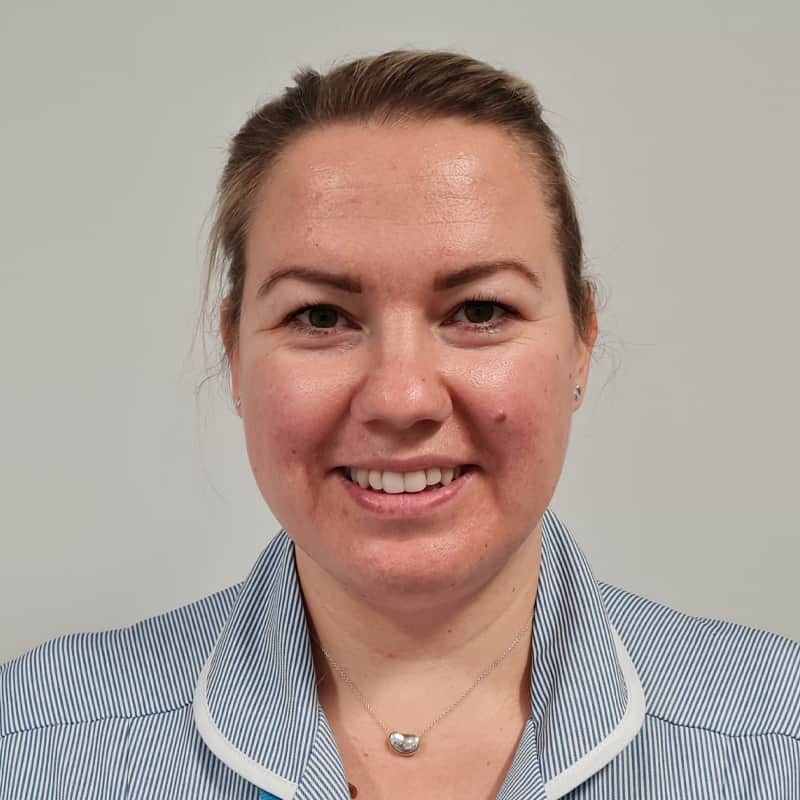
Mariann

Daniel
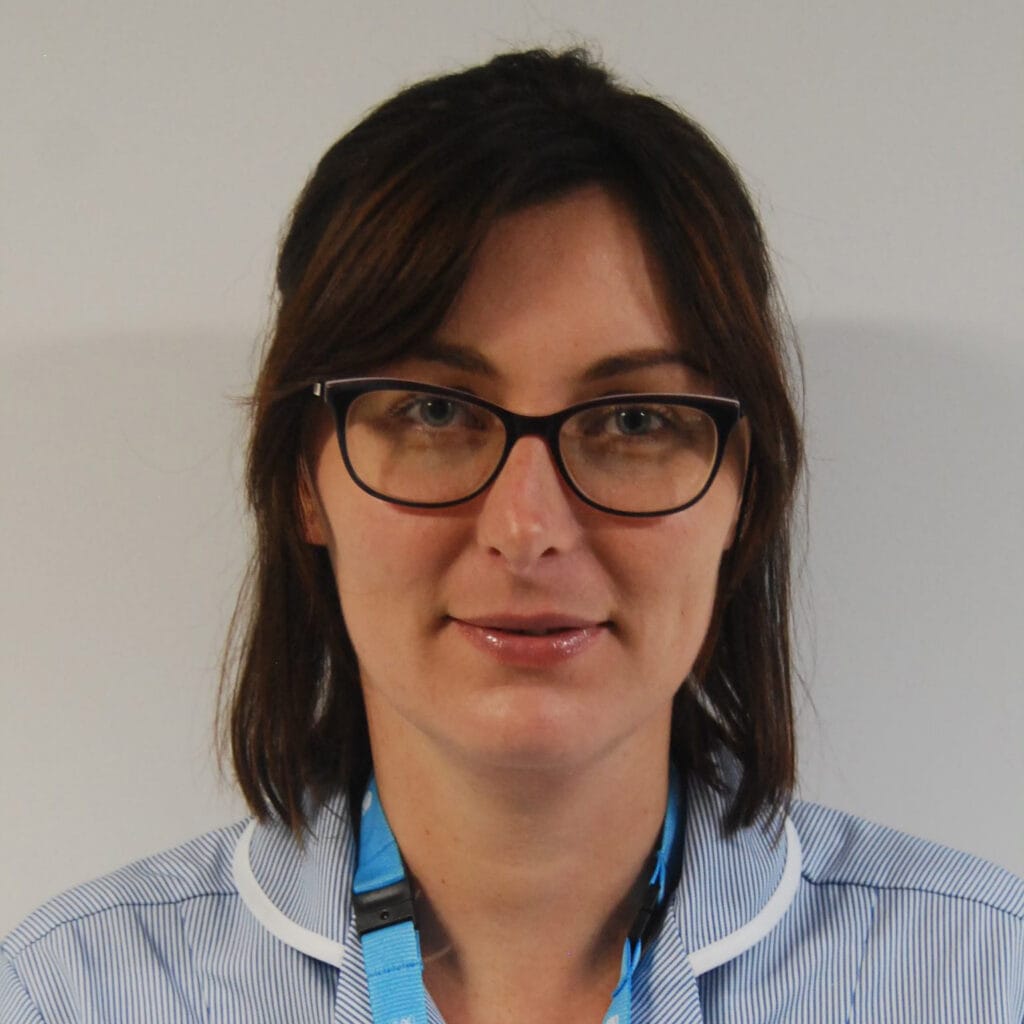
Marta
Teaching and Assessment
Innovative teaching delivered by expert and supportive staff
Collaborative learning
You will experience a range of different techniques on this blended learning course such as experiential learning, keynote lectures and small group seminars.
Our innovative and supportive teaching approach is based on a collaborative learning philosophy, which encourages you to learn with and from others and achieve your own learning goals.
Experiential learning
From clinical practice settings to recreations of community nursing settings, our use of modern, highly-equipped simulation environments and situations, combined with our simulated-based approach to learning, develops your professional practice skills and your confidence ahead of your clinical placements.
You will have the chance to simulate various clinical situations with both actors and real service users in care.
Digital competency
We will work with you to develop your digital competencies across the two years as you utilise a range of technologies which will support your learning both now and in your future career.
We are exploring new technologies constantly and you will be exposed to virtual learning environments that recreate clinical scenarios, in addition to using an online learning practice portfolio and developing your own vlog.
Varied assessment methods
Your placements are assessed through an electronic portfolio, alongside more traditional forms of assessment for your clinical learning. These can include presentations, essays, case-study analyses and exams.
Meet our teaching staff
You’ll be taught by academics, with many who are registered practitioners from a variety of clinical backgrounds.
Nita Muir
Nita is an active researcher as an Adult Registered Nurse and academic with an international reputation, with a particular focus within community nursing and nurse education.
She has undertaken evaluative consultations for Health Education Improvement Wales, is a member of the British Safety Institute, and is on the editorial board of a national nursing journal.
At an international level, Nita has participated in global research and led funded innovation projects to develop sustainable curriculum with colleagues in Zambia, Sweden, Denmark and China.
James Wilson
James is an award-winning nurse academic recognised for his student-focused work in nurse education and interactive theatre. James is a Registered Mental Health Nurse and an innovator in education. He successfully applies transformative learning theory to an immersive suite of drama-based approaches that have since gained national and international recognition and his research interests are in this field. He is also National Teaching Fellow.
Erika Thorne
Erika has been a Senior Lecturer in Nursing for the last 10 years, moving after 25 years from a successful and enjoyable clinical career in critical care. She is a Fellow of the Higher Education Academy and her areas of educational practice include critical/acute care, simulation, pedagogy and practice learning. Erika has a research interest in exploring simulated based education.
Clinical Placements
Transfer the theory into real life practice
Gain vital practice experience
Practice learning will occur within allocated health and social care placements. You will undertake approximately five placements across the two years, ranging from eight to 12 weeks in length.
These placements range across a variety of clinical settings to ensure you experience all fields of nursing, a variety of experiences and the range of hours expected of registered nurses.
Placement allocation
Whilst placement allocation is based on availability across the sector, it is non-negotiable as there is consideration of your home address and travel required. In some instances, travel to placement will be up to one and half hours from your home address. There is a travel bursary available to support this if you are in receipt of the NHS Learning Support Fund.
Expect to:
- Attend placement across the seven day week 24/7
- Travel 1.5 hours one way to placement
- Work in a range of clinical settings i.e., at home, in community and at hospital.
Placement experience days
In addition to the five blocks of clinical placement, we aim to offer placement experience days in the following settings: community care, primary care and health and social care.
This placement experience will occur within each academic module and will encourage you to explore the roles that these health care settings provide in leading patient-centred care.
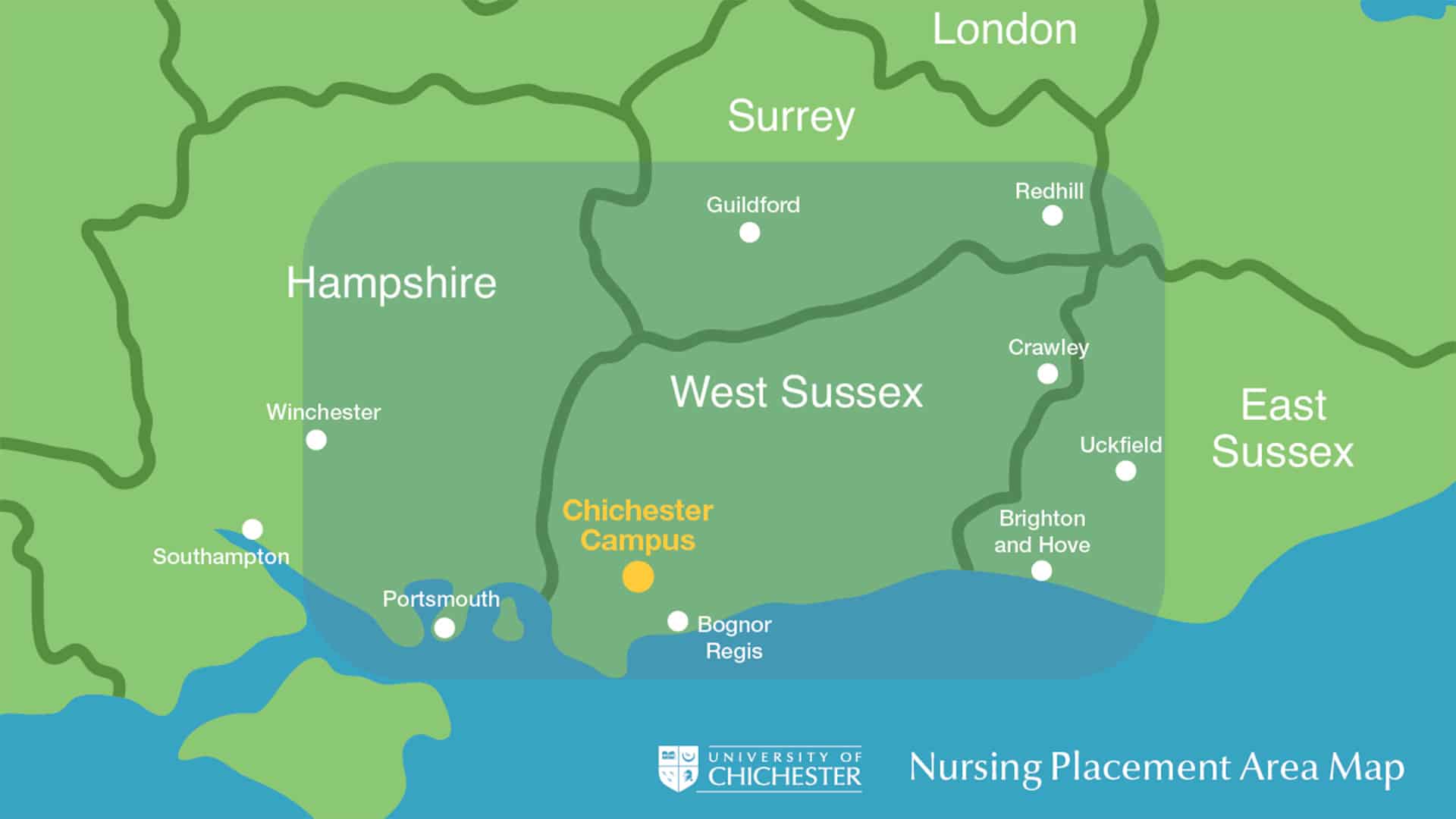
Please note the map above provides an overview of the placement areas and not an accurate representation. Placement travel time will usually be up to an hour and a half from the Bishop Otter campus.
Careers
As a registered nurse, you'll have a varied and fulfilling career ahead of you
Boost your career opportunities in healthcare
On the completion of this course, you will have developed an elevated level of compassionate leadership, excellent digital literacy skills, resilience and evidence-based knowledge, which promotes person-centred/individualised care and will prepare you to enter a modern-day nursing workforce.
Your career options are wide and varied. Healthcare qualifying degrees offer a range of options for future employment both internationally and nationally. Opportunities can include advanced practice in clinical, research, education and leadership areas across the full range of healthcare settings.
Become a core part of a healthcare team
Adult nurses are a key part of the multidisciplinary teams that care for patients. You will be at the centre of teams which can include: social workers, doctors, occupational therapists, pharmacists, radiographers and healthcare assistants. You’ll also work closely with patients’ families and carers.
Prepare for your future with a bespoke careers day
A bespoke careers day is offered with our local health and social care employers designed to prepare you for your future applications, and assist your decision making for your future career in nursing.
Career support
As a University of Chichester graduate, we will provide you with clear guidance for future career choices across the healthcare sector. There will be an opportunity to attend many recruitment fairs with local employers, who will be keen to recruit you.
Guaranteed employment within UHSussex
University Hospitals NHS Trust guarantees employment within UHSussex as a Registered Adult Nurse for those students who successfully complete their degree at University of Chichester and gain professional registration.
This is subject to successful pre-employment checks at the time of graduating.

Potential careers include:
- Community nurse
- Critical care nurse
- Palliative care nurse
- Practice nursing
- Prison nursing
- Care home manager
- Nurse educator
- Nurse researcher
- Nurse leader.
Entry Requirements
Typical Offer (individual offers may vary)
GCSE
Undergraduate Honours Degree
IELTS
In addition to the above criteria, you will also need to:
- Have the required level of digital and technological literacy or demonstrate potential to meet programme outcomes
- Provide validated evidence of study within the last five years
- Complete a Recognition of Prior Learning (RPL) claim prior to entry
- Attend a values-based interview
- Complete a satisfactory occupational health assessment
- Complete an enhanced criminal records check from the Disclosure and Barring Service (DBS)
- Obtain relevant immunisations.
You may be required to pay for some outstanding immunisations.
Technical Requirements for the Course
- An up-to-date PC/Laptop or Mac (Tablets and smartphones are not recommended as sole use for the course)
- A stable internet/Wi-Fi connection
- Chrome of Microsoft Edge web browser to successfully navigate the virtual learning environment
- Working webcam
- Working headphones
- Working microphone.
Student Visa Requirements
Applicants who require a student visa to enter the UK are not eligible to be considered for this course.
Skilled Worker Visa Requirements
Applicants who are in the UK on a Skilled Worker Visa or are a dependent of a skilled worker are not eligible to be considered for this course.
Course Costs
Course Fees 2025/26
UK fee
Learning Support Fund (eligibility criteria applies)
Receive at least £5,000 a year of NHS Funding on this course, with up to £3,000 further funding available for eligible students. Find out more on the NHS website.
For further details about fees, please see our Tuition Fee page.
For further details about international scholarships, please see our Scholarships page.
Course specific costs
- One uniform will be provided but you are likely to require additional uniforms which cost in the region of £30.
- The University will pay for an occupational health assessment; however, you may need to pay for immunisations if they are not covered by your GP.
- You will need a pair of suitable comfortable shoes while on clinical placement and studying in our simulation settings. These must be black and have a waterproof and non-penetrable upper surface (estimated cost £40- £60).
- You are advised to purchase some of your own clinical items, for instance a stethoscope and fob watch (estimated cost £30).
- You will need to be able to travel to your placement – travel expenses can be claimed if you are eligible and in receipt of the NHS Learning Support Fund.
To find out about any further additional costs on this course, please see our Additional Costs page.
